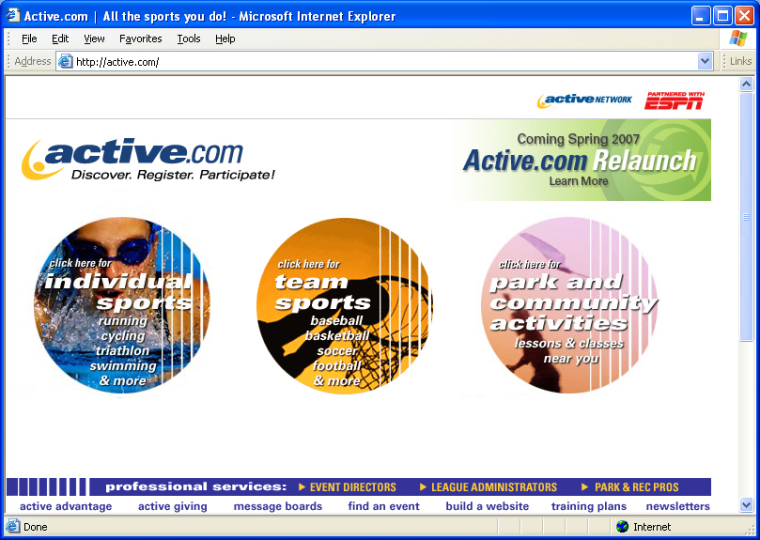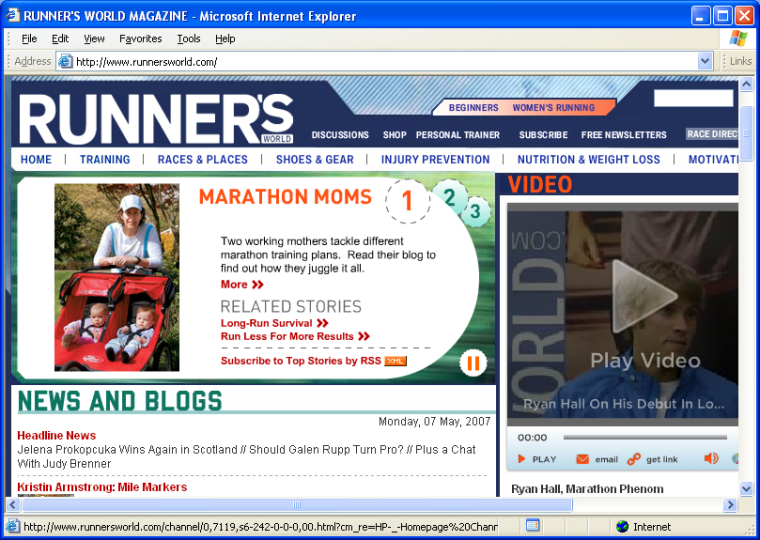I spent the winter trudging along soggy Seattle-area trails. I ran in the pitch-black pre-dawn hours with my German Shepherd trotting by my side. I ran to keep the Pacific Northwest pall at bay and I ran to ward off the effects of too many Christmas cookies. I ran to keep my sanity.
But now that it’s spring, I’m running to train.
I’ve got my eye on a specific race: The Virginia Mason Team Medicine Marathon at Seafair. It’s on July 8 — just over two months away.
I found the Seafair, as its known here in Western Washington, through active.com. The site lists about 7,000 running races at any given time, as well as thousands of triathlons and cycling events. Sign up for a free account on active.com, and you can register for many of these events entirely online.
Active.com also offers online registration for team sports and leagues, but for endurance events like a road race or a triathlon, choose the “Individual Sports” option from the site’s home page. From there, type in the name or type of event and your state or zip code, and the site serves up a list of events in your region.
A search of “running” and my state resulted in a whopping 96 events — too many to page through when you’re a reporter on deadline. Active.com lets you delimit the results by month, and the advanced search will let you choose a date range.
Since active.com is all things to all athletes, the Web site can be a bit hard to navigate. There’s plenty of content — not all of it great — but it’s organized in a puzzling way. For instance, I found an interesting piece on swimming in the “Active Women” section. But if you have the patience, you can find some great nuggets of information as well as a racing event to suit you.
If it’s just running races you’re after, Coolrunning.com offers a slick, multi-parameter way to search for races. The basic search lets you look for events by location, event type or name, while the advanced search lets you hunt for races in a specific region — great for runners who don’t mind making a weekend out of their marathon. The advanced option also offers date ranges, distance ranges and the ability to limit your search by event type (ultramarathons, trail races, etc.).
Race Finder, on Runnersworld.com, also has lots of search parameters: city, state, distance, event size — you can even customize your results by whether you’d prefer an event with chip timing or online registration. Once you’ve zeroed in on your race, however, you’ll likely get kicked back to active.com to register, or to the event’s Web site, if it offers online registration.
Of course, there are plenty of other ways to find a race. Pull up your favorite search engine and type in your logistics and you’ll be sure to get pages and pages of results. But if you want to zero in on an area or a specific distance, you’ll have better luck using one of the customized search engines I’ve mentioned here.

Of course, I’m not sure if I can train for a whole marathon in just 10 weeks. I’ve been running for nearly 20 years and have participated in plenty of races, but I’ve also spent many hours in the physical therapist’s office. I’ve found that the best way to stay injury-free is to run only three days a week, cross-training with cycling, swimming and weight training. So is it possible for me to do 26.2 by July?
I hop back to runnersworld.com and check out Smart Coach, a really nifty tool that serves up a customized training schedule based on your personal data points. You can find Smart Coach about halfway down the site's home page, on the right-hand side.
To get a basic training regimen, I type in a recent race time (if you haven’t raced lately, a time from a speedy training run will do just fine), the distance I’m training for, my current weekly mileage and my preferred training intensity (moderate, hard, very hard). I choose the moderate option.
Looks like I can do it — but it’ll take 16 weeks. My race is sooner than that, so I click on the “revise your training program” link to add more data. Unfortunately, Smart Coach doesn’t seem to retain my original data, so I have to enter it in again — plus more: How long do I have to train? What day do I want my long run to fall on? Once I punch in that information, Smart Coach lowers the boom: I don’t have sufficient time to safely train for the marathon.
Luckily, the Seafair offers a half-marathon — and the schedule Smart Coach serves up for me looks perfect, starting with 11 total weekly miles and gradually laddering me up to 21 miles. Totally doable.
I hit the road two weeks ago with my customized plan, my new Garmin Forerunner 305 and my four-legged friend. Hopefully, we’ll both make it through the training. Stay tuned.
